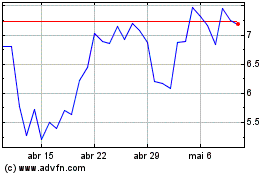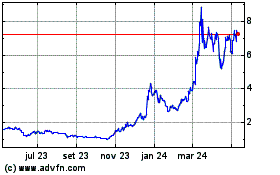Cryptocurrencies plunge amid recession fears and global tensions
On Monday, Bitcoin (COIN:BTCUSD) dropped from $57,531.60 to
$49,050, partially recovering to $53,799. Over $350 million in long
positions were liquidated in two days, the highest value in four
months. Ether hit a low of $2,112.00, the largest daily drop since
2021, recovering to $2,416.23. Other cryptocurrencies like Dogecoin
(COIN:DOGEUSD), Ripple (COIN:XRPUSD), TonCoin (COIN:TONCOINUSD),
Near (COIN:NEARUSD), Avalanche (COIN:AVAXUSD), and Cardano
(COIN:ADAUSD) faced significant losses, and the global stock market
suffered as well.
Bitcoin’s dominance in the cryptocurrency market rose to nearly
60%, the highest this year, with its total market share increasing
due to losses in other cryptocurrencies.
The decline was driven by U.S. economic data and recession
fears, tensions in the Middle East, and asset sales by Jump Trading
and Paradigm VC. Since July 24, Jump Trading sold $377 million in
Wrapped Lido Staked ETH (COIN:WSTETHUSD). This massive sale
exacerbated the decline, putting Ether at risk of falling below
$2,200 and triggering more panic selling.
Shares of cryptocurrency companies also experienced significant
drops, with Coinbase (NASDAQ:COIN) and MicroStrategy (NASDAQ:MSTR)
seeing losses of -6.2% and -9.3%, respectively.
Trading volume in Bitcoin ETFs spikes after market drop
Trading volumes in Bitcoin ETFs exceeded $1 billion early in the
August 5 session, reflecting intense trading activity in response
to market declines. The iShares Bitcoin Trust (NASDAQ:IBIT) led
with over $875 million in trades. This surge follows a drop in
Bitcoin’s price to a low of $49,050.01, triggered by significant
Ether sales by large funds.
Economic concerns spur calls for Fed rate cuts
With global financial markets facing significant declines,
attention is turning to the U.S. Federal Reserve, which has kept
rates between 5.25% and 5.5%. Amid disappointing job reports and
macroeconomic pressures, calls for an emergency rate cut are
growing. Experts like Jeremy Siegel from the Wharton School suggest
a 75 basis point cut now to avoid past policy mistakes and mitigate
recession risks.
Carry trade reversals trigger financial market chaos
On Monday, investors rushed to reverse “carry trades,” a
strategy involving borrowing in low-interest currencies to invest
in higher-yielding assets in other currencies. This move came in
response to a dramatic global sell-off of risk assets, driven by
weak U.S. economic data and a more aggressive stance from the Bank
of Japan, sparking speculation of unwinding profitable positions to
cover losses in other investments.
Xapo Bank expands operations to the UK with unique account offering
Xapo Bank, a Bitcoin-focused institution, announced its
expansion to the UK, becoming the first licensed bank in the region
to offer combined fiat and Bitcoin interest-bearing accounts. The
expansion was made possible after successfully transferring its
banking license to the UK through the “passport” scheme, allowing
direct operations in the British market.
Hackers buy Ether with stolen funds taking advantage of price drop
Hackers took advantage of the recent drop in Ether’s price, from
$2,687.38 to $2,112 in less than 12 hours, to acquire 16,892 ETH
with stolen funds from the Nomad bridge hack. Using 39.75 million
Dai, the criminals bought Ether and moved the funds to Tornado Cash
to obscure their origins. Other stolen funds, such as those from
Pancake Bunny, are also being moved.
Robinhood maintains 24-hour trading despite suspension rumors
Despite rumors that Robinhood Markets (NASDAQ:HOOD) had
suspended its 24-hour trading service due to market volatility, the
company confirmed that the service continues to operate normally.
Reports of suspension circulated on social media amid significant
global market turmoil, comparable to crisis periods in 2020 and
2008. However, Robinhood denied these claims, keeping trading open
during market volatility.
Aave gains $6 million during cryptocurrency market liquidations
The founder of the DeFi protocol Aave (COIN:AAVEUSD) revealed
that the platform generated $6 million in revenue during the recent
cryptocurrency market liquidation. The decline, driven by the Bank
of Japan’s interest rate hike and the U.S. job report, caused
AAVE’s market cap to drop by up to 28.62%. Despite the challenges,
Aave maintained $21 billion in value and raised $802,000 from Ether
position liquidations. The token is currently down -14.8%.
Justin Sun denies rumors and announces $1 billion fund
Justin Sun, founder of Tron and Huobi, denied that HTX leveraged
positions were recently liquidated, stating that the exchange
rarely uses leverage. He announced a $1 billion fund to combat
uncertainty and provide liquidity, but no additional details were
provided. Sun also dismissed rumors of large futures trades and
criticized the lack of transparency in information disclosure.
Elon Musk renews legal dispute with OpenAI
Elon Musk has reopened a legal dispute with OpenAI, accusing
co-founders Sam Altman and Greg Brockman of prioritizing profits
over public good. Less than two months after dropping a previous
lawsuit, Musk claims he was misled into founding the organization,
which initially promised to focus on altruistic AI research. He now
asserts that OpenAI has deviated from its original mission for
self-enrichment, citing a lucrative partnership with Microsoft.
Argo Blockchain maintains stable production in July 2024
Argo Blockchain PLC announced that it mined 48 BTC in July 2024,
maintaining an average daily production of 1.5 BTC, similar to the
previous month. Mining revenue reached $3 million, with a 20%
margin, slightly lower due to a reduced hash price. By the end of
July, the company held 11 BTC. These results reflect Argo’s
operational consistency, prioritizing renewable energy use in its
activities.
New bill expands U.S. Secret Service authority in cryptocurrency
crimes
A new Senate bill seeks to expand the U.S. Secret Service’s
authority to investigate cryptocurrency-related crimes. Introduced
by Senator Catherine Cortez Masto and Senator Chuck Grassley, the
bill aims to combat crimes such as money laundering and financial
fraud. The legislation proposes increased collaboration between
agencies and additional resources to address growing cyber
threats.
Gene Sperling leaves White House to support Kamala Harris campaign
Gene Sperling, a long-time economic advisor who has worked with
the Biden administration since 2021, will leave the White House to
join Kamala Harris’s 2024 presidential campaign. Before his role in
the Biden administration, Sperling was a board member of Ripple
Labs (COIN:XRPUSD) and served as an economic advisor under
Presidents Bill Clinton and Barack Obama. The move is part of a
series of personnel shifts aimed at strengthening Harris’s
campaign.
The value of machine data and the future of Web3
Machine data, though valuable, is largely underutilized.
Blockchain-based DePIN (Decentralized Physical Infrastructure)
technology allows for the tokenization of this data, transforming
physical assets into digital tokens that can be securely and
transparently traded and used. This opens new opportunities for
monetization and investment, improves AI with high-quality data,
and enhances data security. Despite technical challenges, DePIN
promises significant changes for more efficient and decentralized
systems.
NEAR Protocol (COIN:NEARUSD)
Gráfico Histórico do Ativo
De Dez 2024 até Jan 2025

NEAR Protocol (COIN:NEARUSD)
Gráfico Histórico do Ativo
De Jan 2024 até Jan 2025
